Choosing new cookware for your kitchen can be tricky without the correct information. Suppose you want to purchase stone cookware but don't know much about it. Is using stone cookware worth the price and reputation? What are the pros and cons of this material?
We'll answer all of these questions, among others, during this post. Let's dive in below!
Using stone cookware can be great for those who love to cook. However, it's always a good idea to see the pros and cons before making a final decision.
Stone Cookware Pros:
- It holds heat very well
- Distributes heat evenly
- It's perfect for oven-to-table serving
- Keeps food warm during meals
- Has great heat resistance (won't chip/crack)
Stone Cookware Cons:
- Requires more frequent cleaning
- It takes up more storage space
- It can break It is you're rough with it
- It is heavier than other materials
- Can be expensive
As we start this article, we'll cover everything you need to know about stoneware in the kitchen. Whether you love to cook, are curious about stone cooking products, or have other related questions, we're here to help. With that said, let's dive head first into this topic!
Should I Use Stone Cookware?
Yes, if your stoneware is 100% stone material, it will be among the safest cookware on the market. One of the major benefits of stone cooking products is that they're toxin-free.
Unfortunately, many cooking products will have toxic chemicals, so stone options might be better for your health. Stone cookware is also durable, so you don't need to worry about cracking or chipping in high temperatures.
As we said, stone cookware is excellent at distributing heat evenly as you use it. That can significantly impact how quickly you can prepare and serve meals to guests and family.
Again, that doesn't mean stoneware is always the best option, but it certainly has its perks.
Are Stone Pots Good For Cooking?
Like most stone cookware, a stone pot will work great for preparing food. Considering stone materials heat up quickly and stay warm, this can be perfect for soup and pasta.
Furthermore, if you have metal cookware coated in stone, this can also be great for preparing hotter dishes. According to some experts, stone pots also require less butter or oil during cooking, making them a healthier choice.
Usually, cookware advertised as stone will be coated with stone, not 100% made from it. This can be confusing to navigate, but you should be impressed with your new pots, pans, etc.
As we mentioned above, you want to try and find 100% stone pots and cookware to avoid toxins, but this isn't always possible, depending on your needs.
What Are The Benefits Of Using Stone Cookware?
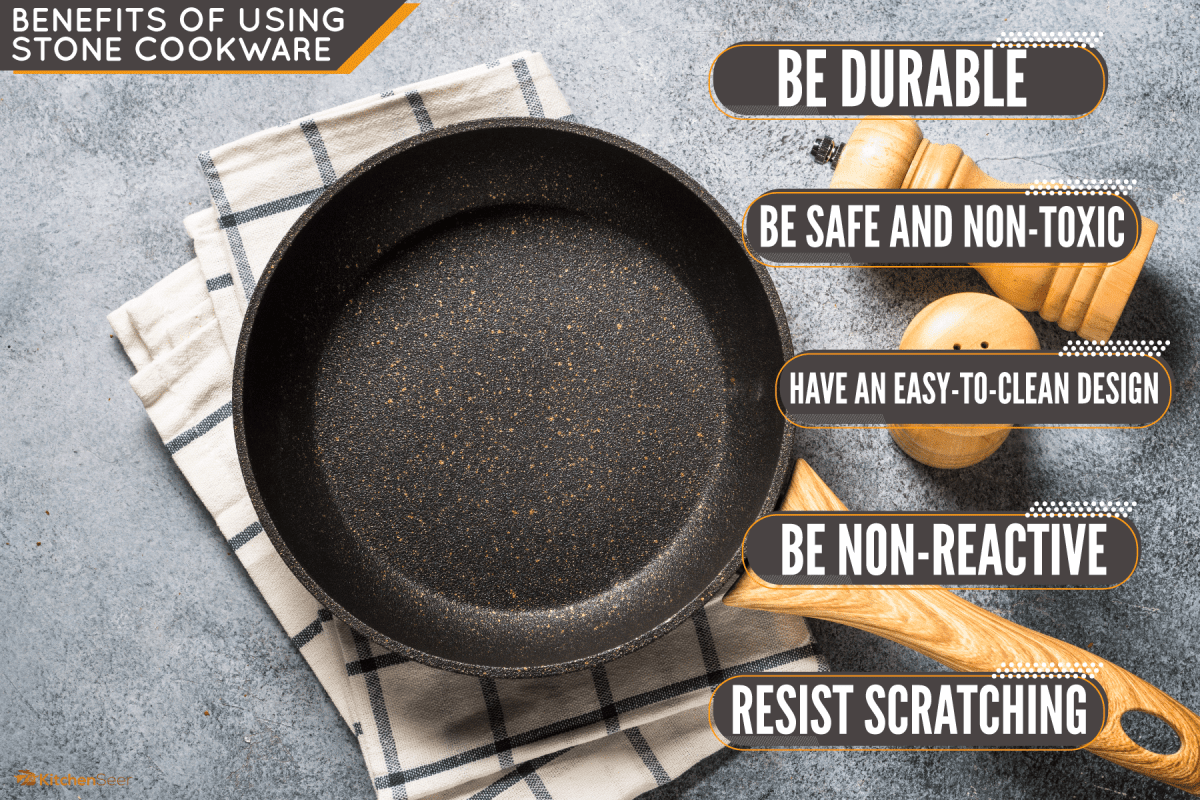
If you're on the fence about stone cookware, you'll want to understand its many benefits. Although we mentioned a few earlier, you can expect stone pots and pans to:
- Be durable
- Be safe and non-toxic
- Have an easy-to-clean design
- Be non-reactive
- Resist scratching
One of the reasons stone cookware is so sturdy is its weight. Although this can also fall into the con list, heavier cookware can resist everyday damage better than finer materials.
So, if you don't mind a heavier lift, stone pots and pans could be a great option. On top of these pros, you also want to remember that stone cookware distributes heat evenly and exceptionally well.
That can be perfect for soups and pasta and even serving your meal directly from the pot at the table.
What Are The Drawbacks Of Using Stone Cookware?
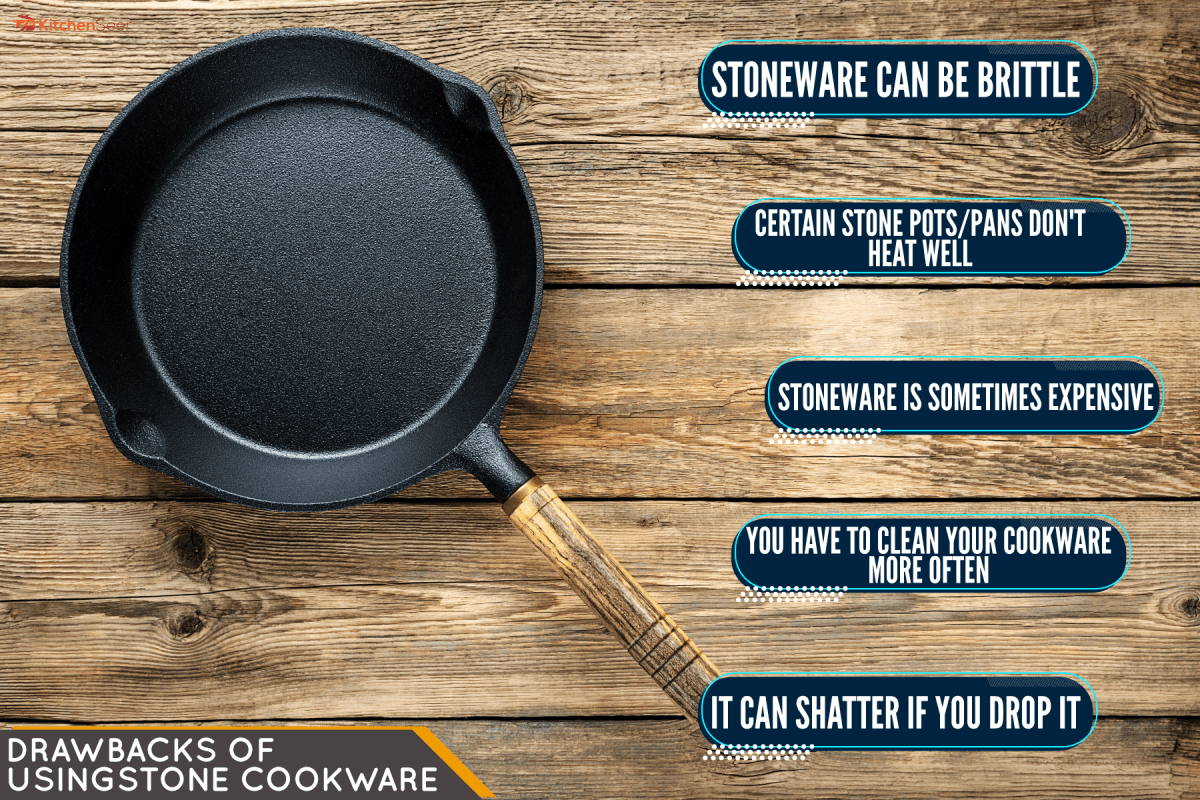
Now that you know the pros of stone cookware let's discuss the drawbacks. Generally, there aren't a ton of negative attributes to this cooking material, but here are the ones we see/hear of the most:
- Stoneware can be brittle
- Certain stone pots/pans don't heat well
- Stoneware is sometimes expensive
- You have to clean your cookware more often
- It can shatter if you drop it
Again, these negatives may not be enough to change your mind, but they're worth considering. Like any cookware or bakeware, stone material isn't perfect.
It's common to see pure stone cookware have trouble heating evenly as it gets older versus stone-coated aluminum or steel. It's usually better to have a metal layer to help with heat distribution, although your cookware wouldn't technically be stone.
Are Stone Frying Pans Safe?
Yes, you can usually count on stone frying pans being safe. Even though we imagine a stainless steel pan when frying comes to mind, stone is another great alternative.
Typically, frying pans will have a nonstick layer. Although this can be useful, the chemicals used to create this nonstick coating aren't always safe for us.
According to The American Cancer Society, newer PFOA-free nonstick cookware won't contain toxic chemicals, although some are still wary.
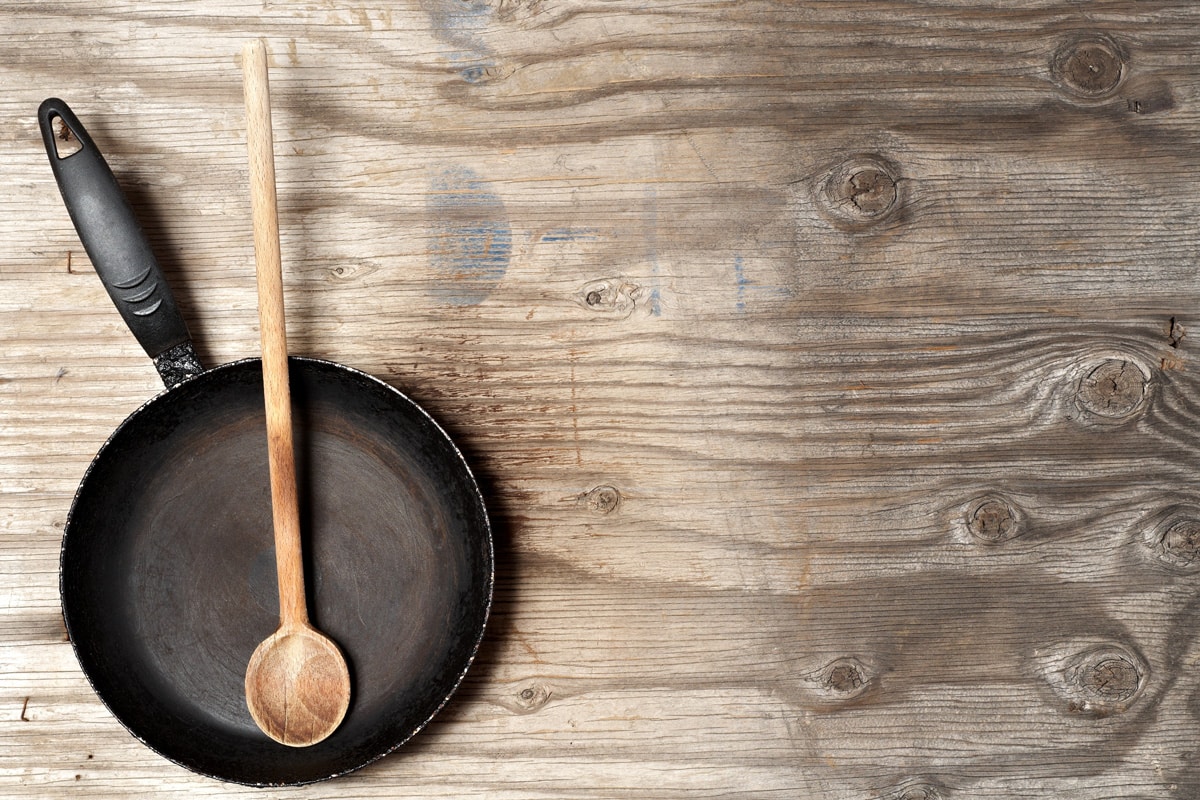
An example of cookware that wasn't always safe is Teflon products. Although this material revolutionized cooking as we know it, that convenience came at a cost.
As we mentioned above, stone cookware doesn't have these chemicals, so there's no risk to your health. That can be especially helpful if you have older cookware, as nonstick has only recently become non-toxic.
What Is The Safest Frying Pan Material?
If you want a safe frying pan to use, stick with stainless steel, cast iron, or 100% stone/ceramic options. Of course, if any of these pans have a nonstick coating, you want to dig deeper into what they're exactly made from.
Regardless of the frying pan material you choose, make sure your product is PFOA-free. PFOA stands for Perfluorooctanoic acid, a synthetic material to resist heat, water, grease, and sticking.
Although this sounds like a miracle product, it can degrade over time and leak into the food it touches. Not only is that unsafe, but it could lead to long-term health side effects.
Unfortunately, most, if not all, nonstick products used PFOAs in their development before it was studied long-term, so older nonstick cookware should go straight into the garbage.
Is Stone-Coated Cookware Healthy?
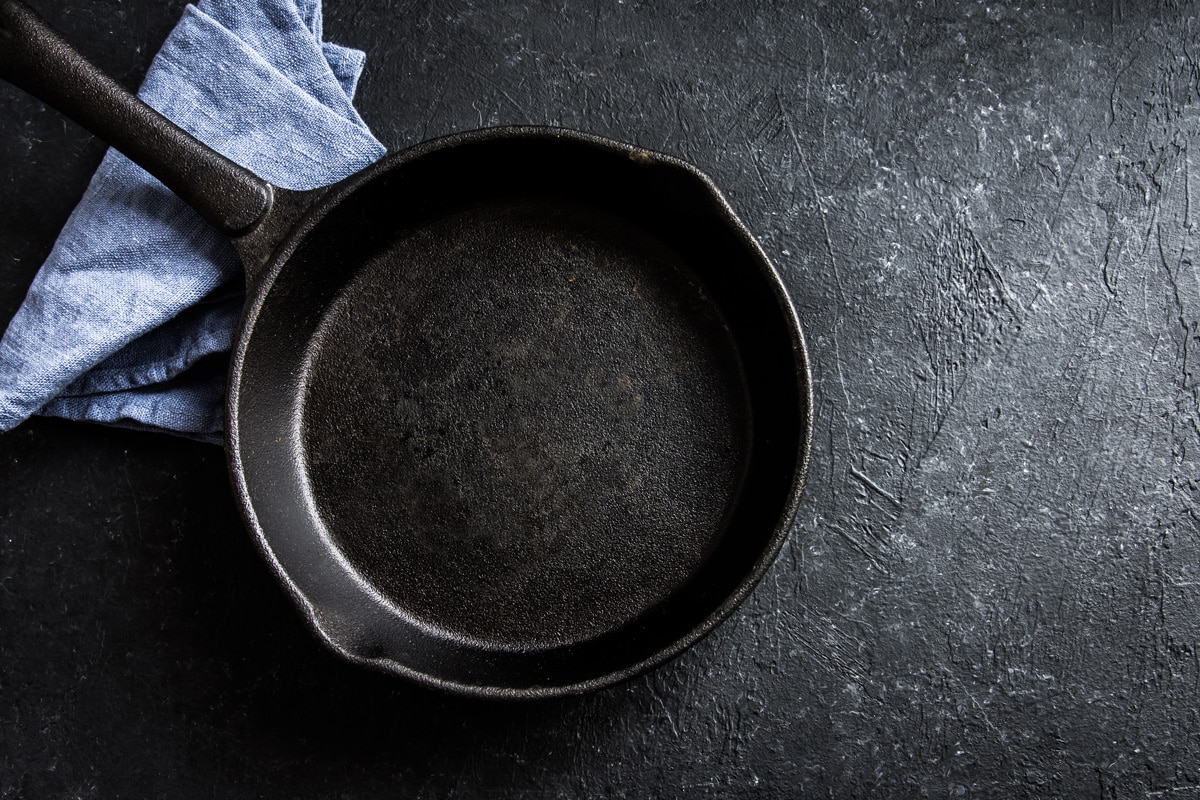
Yes. Stone-coated cookware doesn't contain toxic chemicals, so it will be safe and healthy to use. Unlike older nonstick products, stone and ceramic pots and pans don't utilize synthetic materials to work.
One of the natural benefits of ceramic/stone is that it is nonstick. As we said, you don't need as much oil or butter to lubricate stone cooking products, as they will already be somewhat slippery/stick-proof.
Another reason so many people have switched to stone cookware is that it's acid-free too. In recent years, consumers have shifted toward more eco and human-friendly products and industries, so buying synthetic cookware is a thing of the past.
However, that doesn't always mean that "green cookware" is healthy for you.
Many brands use eco-friendly language for advertising stone-coated/nonstick products, all while using harmful chemicals to seal/produce them. Always check the material list on a cooking product before purchasing.
Is Stoneware Nonstick?
Although stone cookware has some nonstick qualities, it isn't technically the same. Generally, the only products you can truly consider nonstick are PTFE and nonstick ceramic.
Again, nonstick ceramic is essentially coated ceramic or stone cookware, so in a way, it's very similar to genuine stoneware. However, you can't have everything, so you need to purchase a nonstick pot/pan if that's what you're in the market for.
You also want to factor in what you'll use your cookware for when buying one. Not everyone needs nonstick bakeware and cookware in their kitchen, so don't feel obliged to change your mind.
Carote Granite Nonstick Cookware
This cookware set is nonstick, has a granite stone material, is PFOA-free, comes with ten pieces, is healthy and safe to use, and works on induction surfaces.
Check out this cookware set on Amazon.
What Brands Make Stone Cookware?
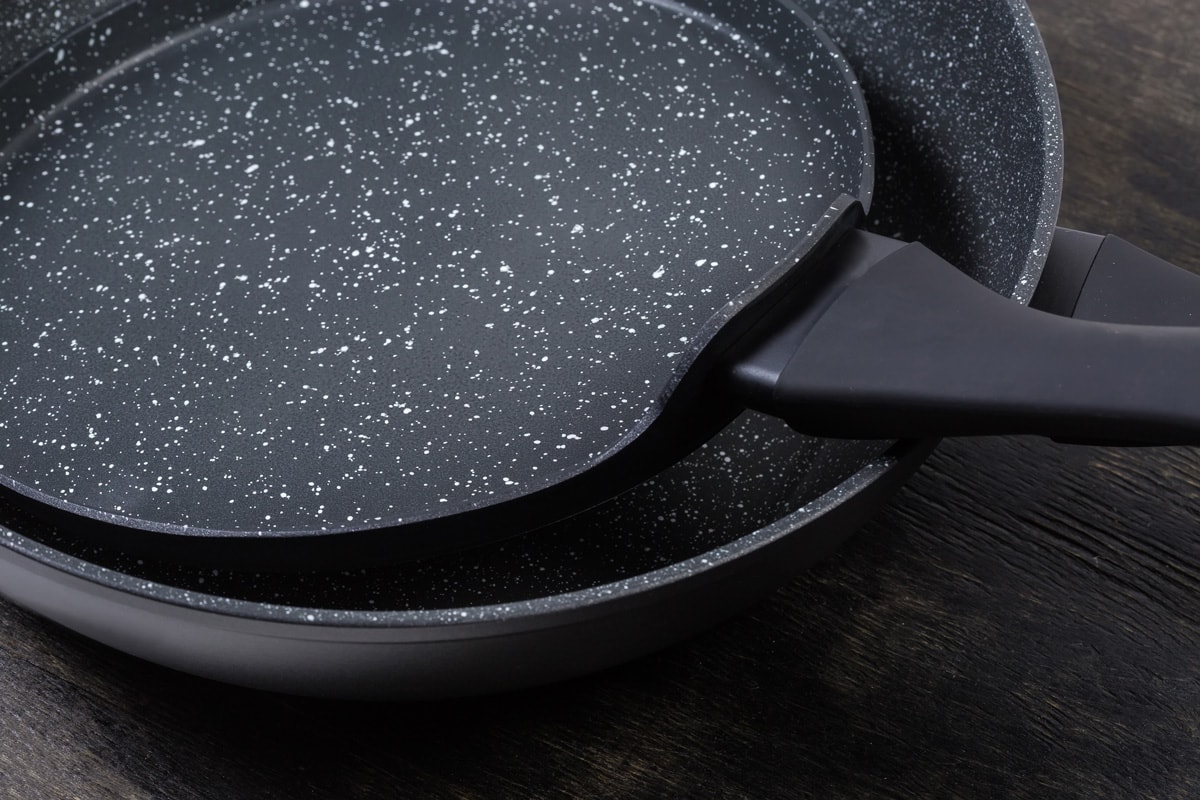
Luckily, there are plenty of brands that make stone cookware. According to a list of the best stone cookware for 2022, companies like Swiss Diamond, Ozeri, ZYLISS, and FlavorStone all offer great options.
As we covered, stoneware is very in-style, so major brands are starting to hop on the trend. Therefore, it shouldn't be challenging to find a great set of pots and pans that you can use for years to come.
You might also see granite stoneware available, so a couple of different materials fall into the ceramic category. Regardless, make sure to find toxin-free products for your kitchen!
How Long Does Stone Cookware Last?
You can typically expect stone cookware to last 5-10 years. Of course, this can vary depending on how often you use your products, so everyone will be different.
As mentioned above, stoneware is heavy and resistant to everyday wear and tear. So, you shouldn't run into chipping or scratching with this type of cookware.
However, they can shatter if you drop or hit stone cooking products. Unlike stainless steel or cast iron, a ceramic pot or pan will break if you drop it or are too rough.
To Wrap Things Up
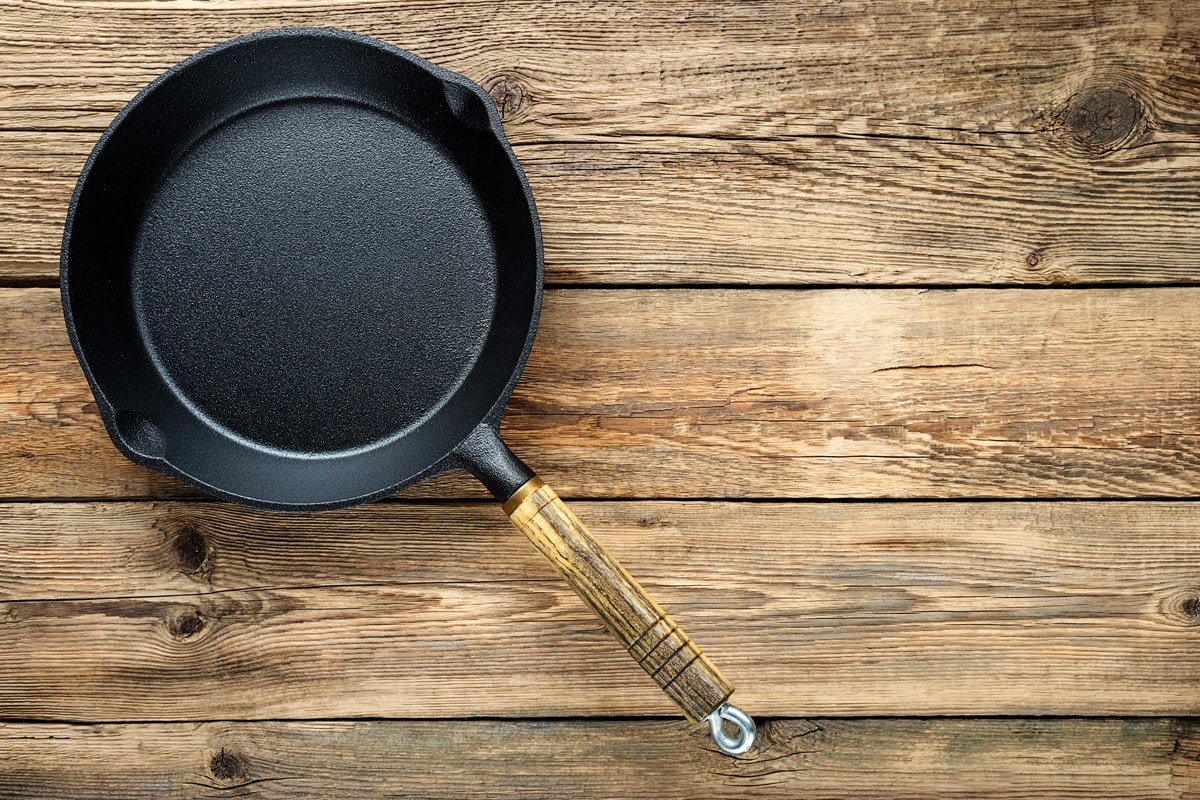
Whether you have stone cookware or want to try it, it's always good to know the pros and cons. From what we found, stoneware is great for heat disruption, serving right from the pot to the table, and is durable.
On the other hand, stone cookware might be more challenging to clean and maintain, so that's something to consider. Additionally, your cooking products may be more expensive if they're stone but won't contain toxic chemicals. So, you get what you pay for.
Regardless, try and find cookware that works for your cooking habits, and always check what your pots and pans are made from!
Made it this far? Check out these helpful related kitchen articles below:
Can Cuisinart Pans And Pots Go In The Oven? [Inc. The Lids]
What's The Best Type Of Pots And Pans For Cooking On A Gas Stove?
Where Should You Store Heavy Pots? [8 Options Explored]


![Set of aluminum cookware on kitchen counter, Can Cuisinart Pans And Pots Go In The Oven? [Inc. The Lids]](https://kitchenseer.com/wp-content/uploads/2022/01/Set-of-aluminum-cookware-on-kitchen-counter-250x250.jpg)
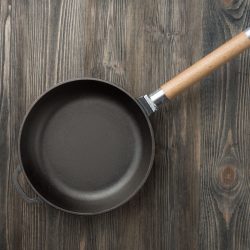
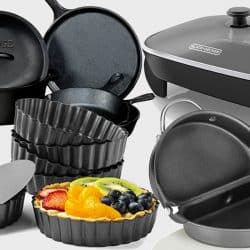
![A stack of vintage floral plates with silver teaspoons on a table near lace doilies - Corelle Vs Porcelain Vs Stoneware: Differences, Pros, And Cons [Which Is Best For You]](https://kitchenseer.com/wp-content/uploads/2022/09/A-stack-of-vintage-floral-plates-with-silver-teaspoons-on-a-table-near-lace-doilies.-250x250.jpg)
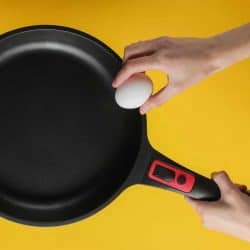
![Empty ceramic plate with brown stains isolated on dusty pink, What Stoneware Dinnerware Is Made In The USA? [11 Options To Choose From]](https://kitchenseer.com/wp-content/uploads/2022/10/Empty-ceramic-plate-with-brown-stains-isolated-on-dusty-pink--250x250.jpg)